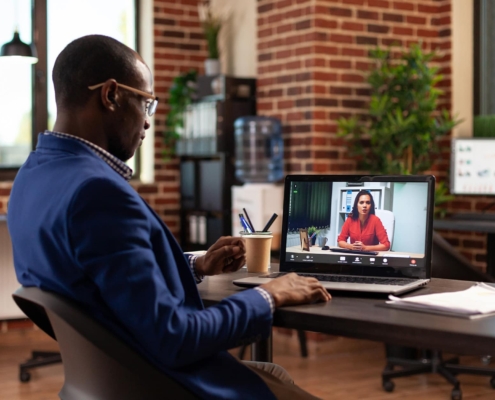 https://sosny.com/wp-content/uploads/2024/05/Why-Your-Business-Needs-Video-Calling.jpg
1250
2000
Nate Riggins
/wp-content/uploads/2024/04/SOS-Logo-Color-New.png
Nate Riggins2024-01-30 17:08:462025-07-10 20:27:59Business Video Calling: What Is It and Why Do You Need It?
https://sosny.com/wp-content/uploads/2024/05/Why-Your-Business-Needs-Video-Calling.jpg
1250
2000
Nate Riggins
/wp-content/uploads/2024/04/SOS-Logo-Color-New.png
Nate Riggins2024-01-30 17:08:462025-07-10 20:27:59Business Video Calling: What Is It and Why Do You Need It?Preventing Cybersecurity Risks Within Your VoIP Phone System
More businesses are switching to VoIP phone systems for their daily operations. Read more to find out about the cybersecurity risks associated with VoIPs and how to prevent them.
Key Points
- VoIPs are an increasingly popular and efficient replacement for traditional PBX systems.
- Because they run through the internet, VoIPs are subject to unique security risks.
- You can increase your VoIP security by improving your passwords, using two-factor authentication, disabling international calling, regularly auditing your business phone system, and partnering with a secure VoIP provider.
What is VoIP?
Voice over Internet Protocol (VoIP) has become the modern office landline, letting you make business calls on nearly any device with an internet connection. With a VoIP, you get the benefits of a centrally hosted PBX—private branch exchange—on any device. You can route and transfer calls through a central location, host conference calls, and collect voicemails.
Hosted VoIPs are also more cost effective than traditional desk phones, so it’s no surprise that many business owners are switching to them. In fact, switching to a VoIP can cut a company’s communication costs by 75%.
What Cybersecurity Risks Come with VoIP?
Because VoIP services require a connection to the internet, they are exposed to the same cyberattacks and data breaches as other online devices. Below, we will explore some of the tactics that cybercriminals use to gain access to your VoIP systems.
Viruses and Malware
Like any piece of technology with internet connection, VoIP phone systems are at risk of attacks from viruses or malware. VoIPs use softphones, which mimic traditional landline phones over the internet. Much like other computer software, viruses and malware can target softphones, stealing valuable information and protected data, or even taking over the entire system.
Since VoIP phone systems can be used with a variety of devices with internet connection, they are susceptible to these threats on a variety of fronts. For example, if your smartphone has been infiltrated by malicious software and you make a VoIP call, the software can access your VoIP phone system by using the mobile phone as an entry point. It can then make its way through your VoIP system, stealing valuable information and credentials.
Denial of Service Attacks
In a denial of service attack, cybercriminals attempt to flood your VoIP phone system with fraudulent messages, attempting to take up all of your server’s available bandwidth. When this happens, the entire VoIP system can slow down or even stop completely, forcing calls to drop prematurely or preventing you from processing them at all. While you deal with cleaning up these requests, cybercriminals can use this time to gain access to your administrative details, putting your data security at risk.
Vishing
Vishing is phishing’s voice-related cousin. Vishing is a social engineering scam in which cybercriminals act as a credible, trustworthy organizations and request confidential details in order to verify your identity over the phone. Vishing scams will often target your financial information or personal identifiers. For example, cybercriminals may call you and pose as your bank, claiming that your account has been compromised. They might request identifiers like your account number, personal identification number (PIN), or login credentials which they will then use against you.
Even though vishing scams seem like they’re easy to spot, they can often be extremely convincing. It’s estimated that vishers stole nearly $30 billion in 2021.
Eavesdropping
Eavesdropping is a common way that cybercriminals try to gain access to your personal information. Since VoIP calls are transmitted through the internet, hackers have the ability to tap into them. From there, they listen for personal data and information like usernames, passwords, phone numbers, or account information. With this data, they can access your service plan, voicemail, and internal administration portals. In the worst cases, these cybercriminals can even use this information to steal your identity.
Cybersecurity Solutions for VoIP Phone Systems
In order to get the most out of your VoIP service, you’ll need to combat these cybersecurity threats. Follow these steps to keep your network secure.
Use Strong Passwords and Change Them Regularly
Most VoIP phone systems come with premade passwords that are easy for hackers to find online. Leaving these login credentials unchanged can put you at risk for cybersecurity attacks—so when you switch to a VoIP, be sure to update your password promptly. Set up a strong password and be sure to change it regularly. Here are a few tips for creating a strong password, which will make it more difficult for hackers to access your information:
- Use at least 12 characters.
- Include numbers, symbols, capital letters, and lowercase letters.
- Don’t include common words, phrases, or personal information.
- Don’t use the same password across multiple locations.
Enable Two-Factor Authentication
Although a strong, unique password is a great starting point for deterring hackers, their methods are consistently improving. Enabling two-factor authentication adds an extra layer of protection to your VoIP phone system. With two-factor authentication, you can ensure that even if a hacker cracks your password, they won’t be able to gain access to your system.
Disable International Calling
If you don’t need to make international calls on a day-to-day basis, disable it. Hackers will often try to rack up minutes on international numbers during their fraud attempts, taking more money out of your pocket and putting your security at risk.
If you do need to make international calls, purchase a calling card instead. Calling cards limit the length and restrict the location of international calls, making them a great tool for preventing cyberattacks.
Regularly Audit Your VoIP Phone System
You can prevent security breaches to your VoIP phone system by regularly performing audits. Look for irregularities in your call log, administrative access during holidays or off-work hours, or unknown IP addresses in your system. These can all be signs of hacking.
Your IT department should also regularly check that your VoIP phone system is functioning properly and that there are no weaknesses or holes in the security system.
Partner with a Secure Office Provider
As cybercriminals’ methods become more sophisticated, it is crucial to get your VoIP phone system through a credible supplier. This way, you can take advantage of the VoIP system without worrying about glaring cybersecurity risks. At Superior Office Solutions, we work with reputable VoIP phone system providers like Nextiva, RingCentral, 8×8, SpectrumVoIP, and Vonage. We’ll help you choose the right provider for your business and make sure you’re fully prepared to make the switch safely.






